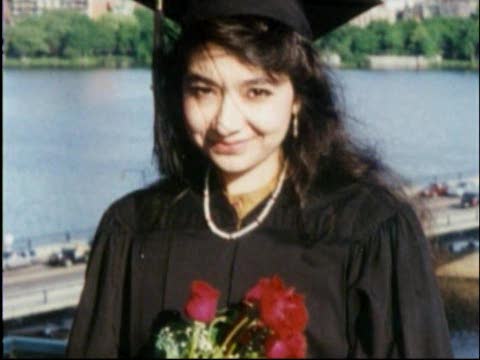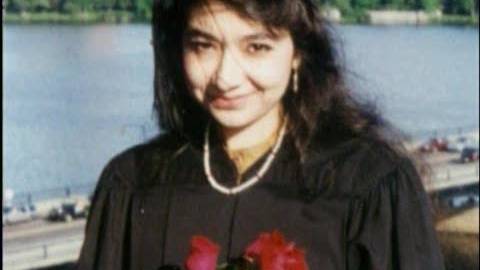Pakistan vows to repatriate US-jailed woman scientist
Source: worldbulletin.net
Pakistan said it would petition US to repatriate a Pakistani mother of three sentenced to 86 years in jail whose fate sparked furious protests.
A US federal court Thursday sentenced Pakistani scientist Aafia Siddiqui to 86 years in prison for trying to kill American soldiers and F.B.I. agents in Afghanistan.
The case of the scientist, Aafia Siddiqui, 38, had attracted wide attention, particularly in Pakistan, where she was widely portrayed as a heroine.
Siddiqui, who has a doctorate from Brandeis University in Massachussets, wore a beige tunic and white headscarf covering her mouth and forehead.
"It is my judgement that Dr Siddiqui is sentenced to a period of incarceration of 86 years," said judge Richard Berman.
Aafia Siddiqui, 38, denounced the trial and said an appeal would be "a waste of time. I appeal to God." “And he hears me.”
Once in the interrogation room on July 18, the day after her arrest, she allegedly grabbed the M4 rifle and started shooting US agents," the trial jury heard. No U.S. agents or soldiers were hit, but Siddiqui was shot and wounded in response, according to U.S. prosecutors’ version of events.
In Karachi, Peshawar and Lahore, word of the sentence prompted protests from parties, which announced plans for nationwide demonstrations on Friday. Outside Siddiqui’s house in Karachi, dozens of protesters chanted anti-American slogans.
Ms. Siddiqui’s lawyers had requested a sentence of 12 years; federal prosecutors had pressed for life imprisonment.
“I am a Muslim, but I do love America, too,” she said. “I do not want any bloodshed,” she added. “I really want to make peace and end the wars.”
Her lawyer, Dawn M. Cardi, said, that the attack was not premeditated, and that Siddiqui was trying to escape from custody because she was petrified and frightened about being tortured, about being sent to Guantánamo.
"We will use every means to bring her back. Doctor Aafia is the daughter of the nation. We fought for her and we will fight politically to bring her back," Prime Minister Yousuf Raza Gilani told parliament.
Interior Minister Rehman Malik said the government would petition the US administration to review the sentence on a humanitarian basis and request that Siddiqui be handed over to Pakistan and dealt with under Pakistani law.
Asked under what circumstances Siddiqui could return home, the foreign ministry said Obama could pardon her, or an agreement could be reached for her to serve at least part of her sentence in Pakistan.
Article from: worldbulletin.net
Despite U.S. Conviction, Questions Still Swirl Around Case Of Pakistani Scientist
The 37-year-old Siddiqui, who is also a mother of three, was convicted of attempted murder and assault. A New York jury found her guilty of grabbing a U.S. officer’s rifle while she was being questioned in 2008 in Afghanistan in connection with containers of chemicals and notes referring to mass-casualty attacks that she was allegedly carrying. She used the rifle to fire at FBI agents and military personnel before she was wrestled to the ground. Siddiqui sustained a gunshot wound in the struggle. No one else was injured.
But there are still no clear answers about her whereabouts in the five years before her detention in Afghanistan. Where was Siddiqui between March 2003 and July 2008? Two of her three children still remain missing. And she has never been tried for her alleged links to Al-Qaeda -- the reason for her original appearance on the FBI’s most-wanted list six years ago.
Declan Walsh, an Islamabad-based foreign correspondent for the British daily "The Guardian," tried to resolve these mysteries last year when he traveled across Pakistan to interview officials, Siddiqui’s relatives, and anybody who would talk to try to solve the puzzle.
Walsh tells RFE/RL that there are two aspects to Aafia Siddiqui’s story. One is the court case in New York, which was strictly focused on the events in a police station in the central Afghan city of Ghazni, where she was interrogated shortly after her arrest in July 2008.
"But the much wider picture really is what was happening with Aafia Siddiqui for the previous five years," he says.
Siddiqui’s name first came to light when she disappeared in March 2003 while traveling to the airport in Karachi, according to her family. Walsh says understanding those five years is the key to unlocking her mystery.
"There are these conflicting accounts about where she was for that period," he says. "But the public opinion here in Pakistan is very much with the train of thought that she was in [the U.S. detention center] in Bagram [Afghanistan].
"And I suppose that this really feeds into the kind of broader anti-Americanism in the country where Dr. Aafia Siddiqui’s case has become symbolic of wider public anger about the disappearances of terror suspects, about people who go missing and who never come back again, and about perceived injustices in the American judicial system towards Muslims and particularly towards Pakistanis."
[...]






















